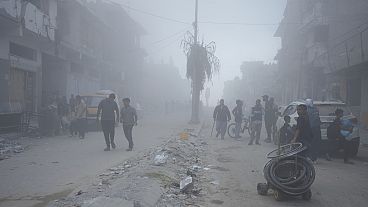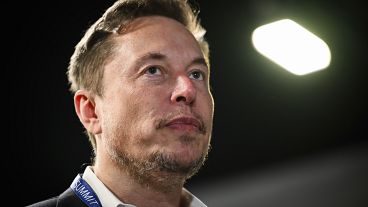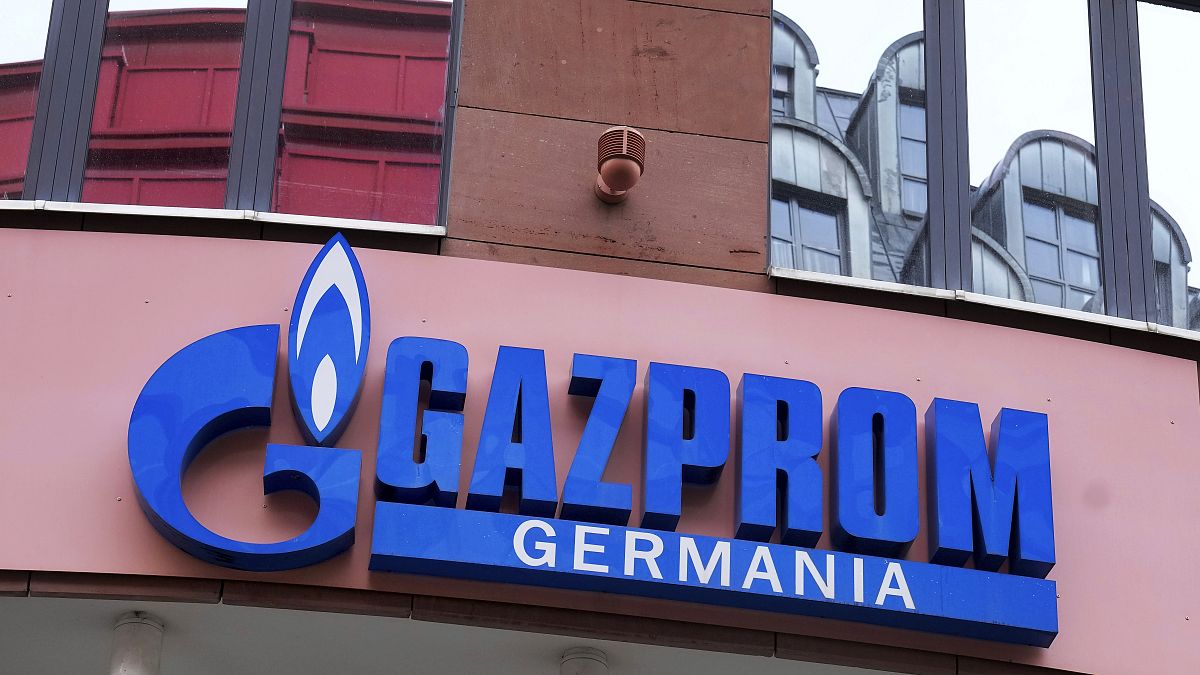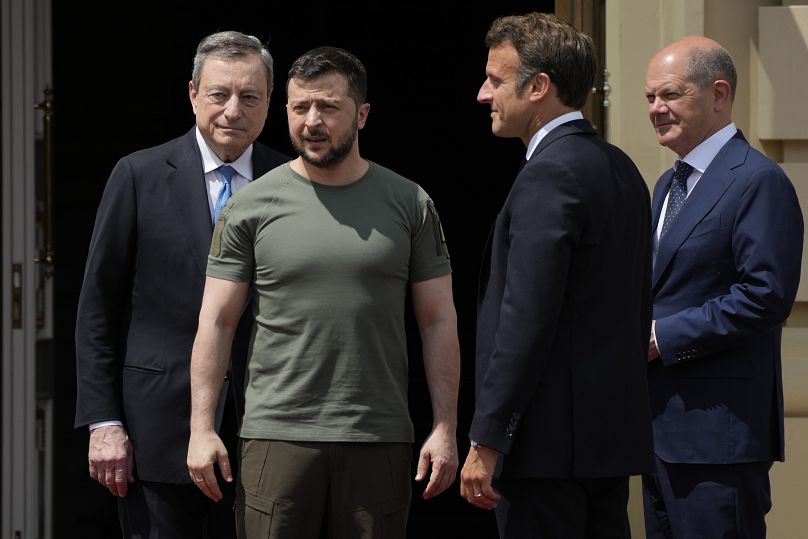Over the past months, Moscow has totally or partially cut off the gas supply to several EU member states, a radical attack that hurts both the European and the Russian economies.
The European Union is on the edge of an energy precipice.
Russia, the bloc's leading provider of fossil fuels, is waging a brutal war against Ukraine with no apparent end in sight. As Western nations slap the country with an ever-increasing number of sanctions, the Kremlin is doubling down on retaliation, going as far as hitting the EU's weakest point: gas dependency.
Over the past months, Moscow has totally or partially cut off the gas supply to several EU member states, a radical attack that hurts both the European and the Russian economies.
The main reason to justify the move has been a decree issued by President Vladimir Putin that forces energy companies to open a rouble-denominated bank account at Gazprombank to conclude their transactions.
As some governments refused to comply with this unilateral imposition, fearing that doing so would breach their contracts and the spirit of EU sanctions, Putin has begun punishing those he sees as "unfriendly" countries.
The bloc is now bracing itself for a total interruption of Russian gas flows, a scenario that many economists think would automatically trigger a deep recession and force governments to ration energy.
The European Commission is working on a plan to coordinate contingency measures and avoid the self-centred approach that hampered the initial response to the COVID-19 pandemic.
"We also need to prepare now for further disruptions of gas supply and even a complete cut-off of Russian gas supply," EU Commission President Ursula von der Leyen has said.
"It is obvious: Putin continues to use energy as a weapon."
These are the EU countries that have so far fallen victim to Russian retaliation.
Poland and Bulgaria
In late April, Poland and Bulgaria became the first EU countries to be cut off from Russian gas.
Gazprom, Russia's state-controlled energy giant, informed the two countries that gas flows would be halted over their continued refusal to pay their bills in roubles.
Poland and Bulgaria openly denounced the two-step payment procedure, vowing to speed up the diversification of their energy mix.
For Poland, the sudden dip was manageable since most of its electricity comes from burning coal. The country has a liquefied natural gas (LNG) terminal in Świnoujście from which it can bring in extra supplies from more trustworthy partners, such as the United States, Qatar, Egypt and Israel.
Bulgaria, which was around 90% dependent on Russian gas, also stepped up LNG purchases and unveiled plans to expand the capacity of a pipeline that pumps gas from Azerbaijan's giant field in the Caspian Sea.
Finland
On May 20, Gazprom told Finland it would proceed to suspend all gas flows after Gasum, the country's state-owned gas wholesaler, refused to comply with the pay-in-roubles decree.
The decision coincided with a push from Helsinki to join NATO, the transatlantic alliance whose expansion Putin has vehemently criticised.
Although Finland was highly dependent on Russian gas, the commodity only accounted for about 5% of its annual energy consumption, making the crisis easier to contain.
Denmark and the Netherlands
In late May, mere days after Finland saw its flows of Russian gas vanish overnight, Denmark suffered a similar fate when Danish energy multinational Ørsted ignored calls to pay in roubles.
"This is totally not acceptable," said Danish Prime Minister Mette Frederiksen said. "This is a kind of blackmailing from Putin."
Almost at the same time, Gazprom fully stopped supplies to Dutch trader GasTerra, also over a refusal to clear their invoices with Russian currency.
GasTerra said it had made the necessary arrangements to secure alternative suppliers and compensate the loss of the expected 2 billion cubic meters (bcm) of Russian gas.
Germany, Italy and France
The three largest economies of the European Union were hit by Russian retaliation in the lead-up to a joint trip to Kyiv by German Chancellor Olaf Scholz, Italian Prime Minister Mario Draghi and French President Emmanuel Macron.
Germany recorded a 40% decline in the flows of Nord Stream 1, the massive pipeline that connects Russia with the northern city of Greifswald and transports up to 55 bcm per year.
Gazprom said repairs to the conduit were the reason behind the reduction, but Berlin fought back, accusing the company of deliberately distorting the market to hike prices and pump extra cash into the Kremlin's coffers.
As gas supplies further dwindled, the government of Olaf Scholz moved to activate the second phase of its three-stage emergency plan, bringing the country closer to rationing measures.
In Italy, energy multinational Eni, which actually opened a rouble-denominated bank account to comply with Putin's decree, said Russian gas supplies had dropped by 15%, a contraction that continues to this day.
Gazprom didn't provide Eni with an explanation for the limited flows.
Prime Minister Draghi then said Gazprom's alleged maintenance of pipes was a lie. "A political use of gas exists just as there is a political use of wheat," he said, referring to the blockade of Ukrainian ports.
Meanwhile in France, network operator GRTgaz initially said it was no longer receiving any pipeline gas from Russia, although the government later clarified supplies were still pouring in, albeit at varying quantities.
Austria, Slovakia and the Czech Republic
The month of June saw more gas reductions to other EU countries.
Austria energy group OMV experienced a decline of 50% in Russian gas, which then slightly improved to around 40% in early July.
Slovak gas utility SPP also recorded a gradual drop in supplies and said volumes could reach half of what was stipulated in the contracts.
The Czech Republic, which currently holds the EU Council's six-month rotating presidency, observed an overall fall in gas transit but noted supplies to the country were not under threat.
"We are ready to work on coordinating gas stocks ahead of the coming winter and to promote voluntary joint purchasing," Czech Prime Minister Petr Fiala told the European Parliament.
"We should always bear in mind that we may find ourselves in a situation where solidarity between member states is needed more than ever."
The growing list of gas suspensions casts serious doubts over the EU's newly-agreed goal to reach a minimum 80% gas storage level by 1 November, a target designed to avoid a winter of scarcity and discontent.
Current storage level across the bloc stands at 60%, with only three countries – Portugal, Poland and Denmark – above the 80% mark.













